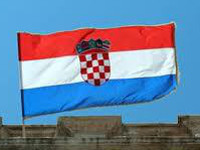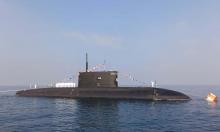European Union takes Croatia to fascism
Over 65 percent of Croatia's population supported the definition of marriage as the union between a man and a woman, thus rejecting the idea of same-sex marriage. Foreign media are talking about the "division of the country into two camps" and the harassment of sexual minorities. But there is no division, rather, there is a risk that Croatia may return to the fascist Ustasha ideology under pressure from the EU.

The Croatian government of Social Democrats wanted to take the path of the French authorities and legalize same-sex marriage, indicating in the Constitution that marriage is not necessarily a union between a man and a woman. In schools early this year "health" lessons were introduced that were meant to explain gender diversity. Then, under the leadership of the church, the society responded by collecting signatures for a referendum.
According to Croatian law, a referendum requires ten percent of the vote of the active population, and in this case nearly 50 percent of the votes have been collected (750 thousand signatures in a country of 4.4 million people). Vice John Batarelo, head of the department for the pastoral care of the family of the Zagreb Archdiocese, a founder of "In the name of the Family" (the initiator of the referendum), said that they saw what was happening in France and other countries, and decided to add this provision in the Constitution to protect traditional values.
This is the first referendum initiated by citizens in 23 years of independence. Unlike other Western countries, especially those dominated by Anglican and Protestant churches, Catholic Croatia (90 percent of the population call themselves believers) has not lost traditional values. Croatia and, perhaps, Poland (the Sejm has rejected a law on same-sex marriage in early 2013) are the only countries where the population actively opposes homosexuality. On the other hand, Croatia is a member of the European Union and is obliged to profess the policy of tolerance. In this context, a referendum was a result of a major political battle between the government and the people of Croatia and created a precedent for similar actions in Europe.
Approximately 33 percent of the voters voted against the traditional definition of marriage. Especially indicative is the percentage of Croats who voted abroad, that is, those who have already seen enough of tolerance towards gays - 73.26 percent voted for the traditional family (26.21 voted against). The referendum results are binding for the government, but
the authorities took the will of the people in arms. Croatian President Ivo Josipovic said that he had voted "against," and that the results were not surprising for those who have followed the development of the situation.
Josipovic warned that the referendum results can contribute to Croatia's reputation as an intolerant country. According to Croatian Prime Minister Zoran Milanovic, the referendum jeopardized people's right to happiness and choice. Maria Lugarich, deputy of the Croatian Club of the Social Democratic Party, said that the fact that family life of heterosexual couples is guaranteed by the Constitution, and that of the homosexuals is not, was discriminatory.
The EU has not officially commented on the referendum, however, it is likely to express their dissatisfaction with Croatia in one way or another, said Anna Filimonova, a researcher at the Center for the Study of the Balkans Crisis Institute of Slavic Studies.
"The EU is governed by the norms that seemingly have never been recorded, but that everyone must comply with. We can talk about a certain neoliberal dictatorship that imposes processes in the economy, politics, social sphere, spiritual and cultural values that lead to degradation," Filimonova told Pravda.Ru.
Croatia is a country with strong traditional values, and faith and family are in the first place there, just as well as statehood. What did Croatia see in the European Union? According to the analyst, the economy is falling apart and slipping into a recession according to the Greek scenario with a debt of $47 billion. Apathy, fatigue, and irritation are developing in the Croatian society. "The Croats will not survive the attack on the last thing that they have left. They do not want to be dictated how to behave in intimate life. I think this could lead to a serious social and political protest," said Filimonova.
Answering the question why the government has not even formally supported its people, the political scientist noted that Europe did not have national governments. "We can virtually no longer talk about national governments in the EU. The authorities are appointed officials. Look at the European Parliament, for example, Catherine Ashton (EU High Representative of the Union for Foreign Affairs and Security Policy - Ed.). Who is she, where did she come from, why is she there dealing with very important issues? In EU member states there are so-called "cardboard governments," i.e., people who do not make any decisions."
Croats will be punished for disobeying. Economic sanctions are possible, and the Croatian national elite may find itself in a very difficult situation. The same applies to the people, which will only lead to an increased apathy. This, in turn, will lead to an increased nationalist sentiment and the revival of the fascist Ustasha ideology. This force is being reborn, which is very dangerous, the analyst warned.
So far other European countries are looking at the Croats. Slovakia media reported that there is an initiative of Slovak citizens to conduct a similar referendum in their country.
Lyuba Lulko
Pravda.Ru
Subscribe to Pravda.Ru Telegram channel, Facebook, RSS!




